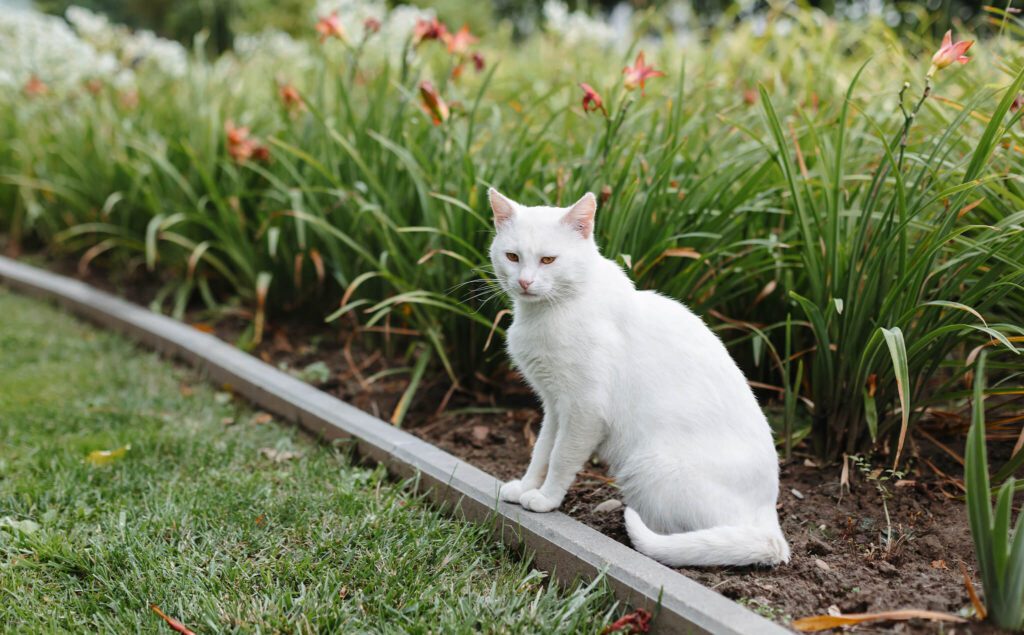5 Reasons Why Lilies are Toxic to Cats
Seeing your cat next to a lily might seem like a harmless, even beautiful sight. However, this common scenario could be dangerous for your pet. Lilies are extremely toxic to cats, and understanding why can help keep your cat safe. Let’s learn about the five main reasons lilies pose a threat to cats. If your cat ever comes into contact with a lily, getting help from one of our Emergency Veterinary Care Centers locations is essential. The experts there can provide the care your cat needs. So, if you’re ever in doubt, make sure to call for an appointment or more information.

1. Kidney Damage
One of the most serious dangers lilies pose to cats is kidney damage. Even a small amount of lily, whether it’s the leaf, petal, or pollen, can cause severe kidney problems. Within just a few hours of ingestion, your cat could be at risk of kidney failure. This is because the toxins in lilies are very strong and cats’ bodies can’t handle them. If you see your cat next to a lily or suspect they’ve ingested part of one, it’s urgent to seek professional help.
How Kidney Damage Occurs
When a cat eats a lily, the toxins quickly get absorbed into their bloodstream. These toxins then make their way to the kidneys, where they cause inflammation and damage. This damage can happen very fast and might be irreversible if not treated promptly.
2. Gastrointestinal Upset
Lilies can cause more than just kidney issues. They can also lead to gastrointestinal upset in cats. This means your cat might experience vomiting, diarrhea, and a lack of appetite. These symptoms are not only uncomfortable for your cat but can also lead to dehydration and further health complications.
Signs of Gastrointestinal Upset
Watch for signs like your cat being less active than usual, not wanting to eat, or having upset stomach issues. These could be signs that your cat has been poisoned by a lily and needs immediate attention.
3. Heart Rhythm Problems
Another less known but equally dangerous effect of lily ingestion is on a cat’s heart. The toxins can affect how the heart beats, leading to irregular rhythms. This can be very serious and even life-threatening if not treated quickly.
Understanding Heart Issues
The heart problems caused by lily poisoning can vary from mild to severe. In some cases, it might lead to other complications, making it critical to get your cat checked by a vet as soon as you suspect they’ve been exposed to lilies.
4. Severe Dehydration
As mentioned, vomiting and diarrhea caused by lily poisoning can lead to severe dehydration. Dehydration can quickly become dangerous for cats, affecting their overall health and leading to more serious conditions if not addressed immediately.
The Importance of Hydration
Keeping your cat hydrated is key, especially if they’ve ingested a lily. However, in cases of poisoning, professional help is needed to properly rehydrate your cat and address the underlying cause.
5. Allergic Reactions
Some cats may have an allergic reaction to lilies, leading to symptoms like swelling, itching, or difficulty breathing. While not all cats will experience an allergic reaction, those that do require immediate veterinary care to manage the symptoms.
Recognizing Allergic Reactions
If your cat is showing signs of discomfort, excessive scratching, or breathing issues after being around lilies, it’s important to seek veterinary care right away. These could be signs of an allergic reaction to the plant.
Keeping Your Cat Safe
The best way to protect your cat from the dangers of lilies is to avoid having them in your home or garden. There are many beautiful and safe alternatives that pose no risk to your cat. Always check the safety of plants before bringing them into your home and educate visitors about the risks certain plants, like lilies, can pose.
Safe Plant Alternatives
If you love having plants around, consider cat-safe options like spider plants, Boston ferns, or bamboo. These plants can add beauty to your home without posing a risk to your cat.
What to Do in an Emergency
If your cat has ingested a lily, it’s crucial to act fast and get them to an Emergency Veterinary Care Center’s location. The professionals there can provide the necessary care and treatment to help your cat recover. Don’t try to treat your cat on your own; always seek professional help.
Contacting Emergency Veterinary Care Centers
Keep the number for your local Emergency Veterinary Care Centers handy. If you suspect your cat has come into contact with a lily, call them immediately for advice and to let them know you’re on your way.
Understanding why lilies are toxic to cats and what to do if your cat is exposed can help keep your pet safe. Seek professional help if you suspect your cat has ingested any part of a lily. Remember, the team at your local Emergency Veterinary Care Centers is there to help, so don’t hesitate to call for an appointment or more information if you need assistance.
Recent Posts
About Us
At Emergency Veterinary Care Centers (EVCC), we know that pet emergencies are unpredictable and often stressful. That's why our team, with over 20 years of emergency and critical care experience, is ready to assist you and your pet in the toughest situations.


